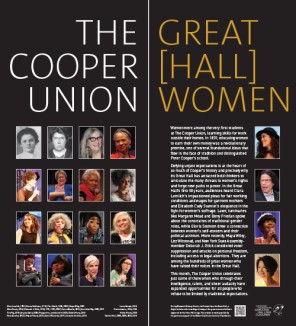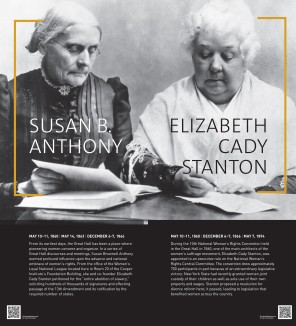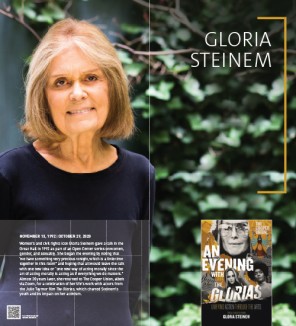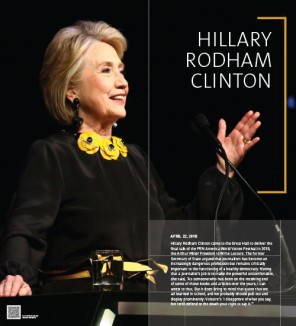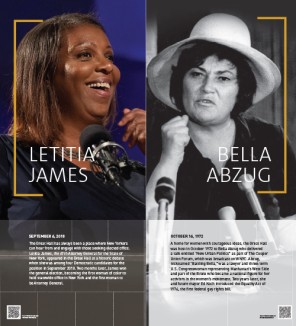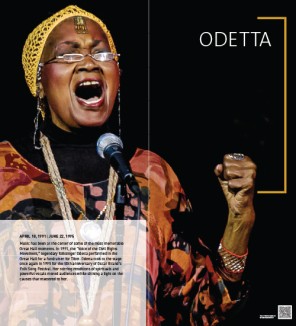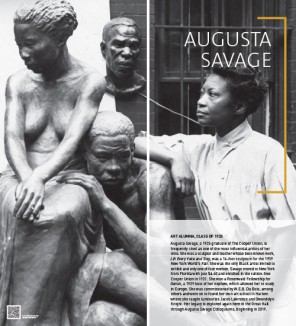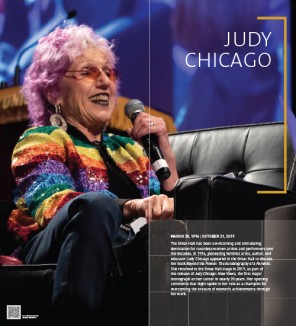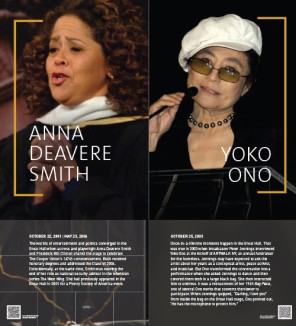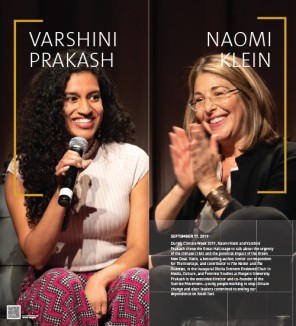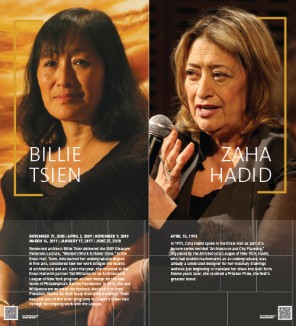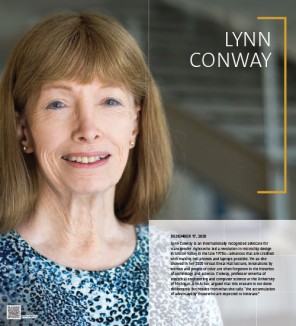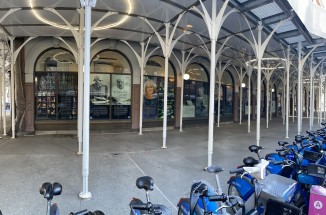Great Women Live from the Great Hall Exhibition Photo Gallery
The "Great Women Live from the Great Hall” exhibition on view in the street-level colonnade windows of The Cooper Union's Foundation Building celebrates the achievements of pioneering women from across the arts, sciences, and civic life who have spoken on the Great Hall stage. The public exhibition was curated as part of Women's History Month to accompany "Great Women Live from the Great Hall," a special day of Cooper Union programming that includes women's and civil rights icon Gloria Steinem and Pulitzer Prize winner Salamishah Tillet in conversation and a performance by headliners in music, dance, and theater, such as New York City Ballet principal dancer Tiler Peck and Grammy-winners Melissa Manchester and Lisa Fischer.

The exhibition and public program are part of The Cooper Union’s Gardiner Foundation Great Hall Forum series.

(l) May 10, 11, 1860 | May 14, 1863 | December 6, 7, 1866: From its earliest days, the Great Hall has been a place where pioneering women convene and organize. In a series of Great Hall discourses and meetings, Susan Brownell Anthony exerted profound influence upon the advance and national embrace of women’s rights. From the office of the Women’s Loyal National League located here in Room 20 of the Cooper Institute’s Foundation Building, she and co-founder Elizabeth Cady Stanton petitioned for the “entire abolition of slavery,” soliciting hundreds of thousands of signatures and effecting passage of the 13th Amendment and its ratification by the required number of states.
(r) May 10–11, 1860 | December 6–7, 1866 | May 7, 1894: During the 10th National Woman’s Rights Convention held in the Great Hall in 1860, one of the main architects of the women’s suffrage movement, Elizabeth Cady Stanton, was appointed to an executive role on the National Woman’s Rights Central Committee. The convention drew approximately 700 participants in part because of an extraordinary legislative victory: New York State had recently granted women joint custody of their children as well as sole use of their own property and wages. Stanton proposed a resolution for divorce reform here; it passed, leading to legislation that benefited women across the country.
November 13, 1992 | October 29, 2020: Women’s and civil rights icon Gloria Steinem gave a talk in the Great Hall in 1992 as part of an Open Center series on women, gender, and sexuality. She began the evening by noting that “we have something very precious tonight, which is a little time together in this room” and hoping that all would leave the talk with one new idea or “one new way of acting morally since the art of acting morally is acting as if everything we do matters.” Almost 20 years later, she returned to The Cooper Union, albeit via Zoom, for a celebration of her life’s work with actors from the Julie Taymor film The Glorias, which charted Steinem’s youth.
April 22, 2018: Hillary Rodham Clinton came to the Great Hall to deliver the final talk of the PEN America World Voices Festival in 2018, the Arthur Miller Freedom to Write Lecture. The former Secretary of State argued that journalism has become an increasingly dangerous profession but remains critically important to the functioning of a healthy democracy. Noting that a journalist’s job is to make the powerful uncomfortable, she said, “As someone who has been on the receiving end of some of those books and articles over the years, I can attest to that. But it does bring to mind that quote that we all learned in school, and we probably should pull out and display prominently: Voltaire’s ‘I disapprove of what you say, but I will defend to the death your right to say it.’”
(l) September 6, 2018: The Great Hall has always been a place where New Yorkers can hear from and engage with those seeking elected office. Letitia James, the 67th Attorney General for the State of New York, appeared in the Great Hall at a historic debate when she was among four Democratic candidates for the position in September 2018. Two months later, James won the general election, becoming the first woman of color to hold statewide office in New York and the first woman to be Attorney General.
(r) October 16, 1972: A home for women with courageous ideas, the Great Hall was host in October 1972 to Bella Abzug who delivered a talk entitled “New Urban Politics” as part of The Cooper Union Forum, which was broadcast on WNYC. Abzug, nicknamed “Battling Bella,” was a lawyer and three-term U.S. Congresswoman representing Manhattan’s West Side and part of the Bronx who became a national figure for her activism in the women’s movement. Two years later, she and future mayor Ed Koch introduced the Equality Act of 1974, the first federal gay rights bill.
April 18, 1991 | June 22, 1995: Music has been at the center of some of the most memorable Great Hall moments. In 1991, the “Voice of the Civil Rights Movement,” legendary folksinger Odetta performed in the Great Hall for a fundraiser for Tibet. Odetta took to the stage once again in 1995 for the 50th anniversary of Oscar Brand’s Folk Song Festival. Her stirring renditions of spirituals and powerful vocals moved audiences while shining a light on the causes that mattered to her.
Art alumna, Class of 1925: Augusta Savage, a 1925 graduate of The Cooper Union, is frequently cited as one of the most influential artists of her time. She was a sculptor and teacher whose best-known work, Lift Every Voice and Sing, was a 16-foot sculpture for the 1939 New York World’s Fair. She was the only Black artist invited to exhibit and only one of four women. Savage moved to New York from Florida with just $4.60 and enrolled in the tuition-free Cooper Union in 1921. She won a Rosenwald Fellowship for Gamin, a 1929 bust of her nephew, which allowed her to study in Europe. She was commissioned by W.E.B. Du Bois, among others and went on to found her own art school in Harlem where she taught luminaries Jacob Lawrence and Gwendolyn Knight. Her legacy is explored again here in the Great Hall through Augusta Savage Colloquiums, beginning in 2019.
March 20, 1996 | October 21, 2019: The Great Hall has been a welcoming and stimulating destination for countless women artists and performers over the decades. In 1996, pioneering feminist artist, author, and educator Judy Chicago appeared in the Great Hall to discuss her book Beyond the Flower: The Autobiography of a Feminist. She returned to the Great Hall stage in 2019, as part of the release of Judy Chicago: New Views, the first major monograph on her career in nearly 20 years. Her opening comments that night spoke to her role as a champion for overcoming the erasure of women’s achievements through her work.
(l) October 22, 2001 | May 23, 2006: The worlds of entertainment and politics converged in the Great Hall when actress and playwright Anna Deavere Smith and President Bill Clinton shared the stage to celebrate The Cooper Union’s 147th commencement. Both received honorary degrees and addressed the Class of 2006. Coincidentally, at the same time, Smith was nearing the end of her role as national security advisor in the television series The West Wing. She had previously appeared in the Great Hall in 2001 for a Poetry Society of America event.
(r) October 25, 2003: Once-in-a-lifetime moments happen in the Great Hall. That was true in 2003 when broadcaster Peter Jennings interviewed Yoko Ono at the kickoff of ARTWALK NY, an annual fundraiser for the homeless. Jennings may have expected to ask the artist about her years as a conceptual artist, peace activist, and musician. But Ono transformed the conversation into a performance when she asked Jennings to dance and then covered them both in a large black bag. She then instructed him to undress. It was a reenactment of her 1965 Bag Piece, one of several Ono works that converts the viewer to participant. When Jennings quipped,“Darling, I love you” from inside the bag on the Great Hall stage, Ono pointed out, “He has the microphone to protect him.”
September 17, 2019: During Climate Week 2019, Naomi Klein and Varshini Prakash chose the Great Hall stage to talk about the urgency of the climate crisis and the potential impact of the Green New Deal. Klein, a bestselling author, senior correspondent for The Intercept, and contributor to The Nation and The Guardian, is the inaugural Gloria Steinem Endowed Chair in Media, Culture, and Feminist Studies at Rutgers University. Prakash is the executive director and co-founder of the Sunrise Movement—young people working to stop climate change and elect leaders committed to ending our dependence on fossil fuel.
(l) November 21, 2005 | April 2, 2009 | November 9, 2009 | March 14, 2011 | January 17, 2017 | June 27, 2018: Renowned architect Billie Tsien delivered the 2009 Eleanore Pettersen Lecture, “Women’s Work Is Never Done,” in the Great Hall. Tsien, who earned her undergraduate degree in fine arts, considered how her work bridges the realms of architecture and art. Later that year, she returned to the Great Hall with partner Tod Williams for an Architectural League of New York program on their design for the new home of Philadelphia’s Barnes Foundation. In 2013, she and Williams were awarded the National Medal of Arts from President Obama for their many distinctive buildings. Tsien was also part of five other programs in Cooper’s Great Hall through her ongoing work with the League.
(r) April 15, 1993: In 1993, Zaha Hadid spoke in the Great Hall as part of a lecture series entitled “Architecture and City Planning,” organized by the Architectural League of New York. Hadid, who had studied mathematics as an undergraduate, was already a celebrated designer for her visionary drawings and was just beginning to translate her ideas into built form. Eleven years later, she received a Pritzker Prize, the field’s greatest honor.
December 17, 2020: Lynn Conway is an internationally recognized advocate for transgender rights who led a revolution in microchip design in Silicon Valley in the late 1970s—advances that are credited with making cell phones and laptops possible. Yet as she showed in her 2020 virtual Great Hall lecture, innovations by women and people of color are often forgotten in the histories of technology and science. Conway, professor emerita of electrical engineering and computer science at the University of Michigan, Ann Arbor, argued that this erasure is not done deliberately but results from what she calls “the accumulation of advantages by those who are expected to innovate.”

